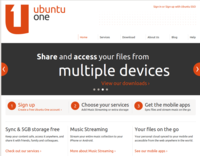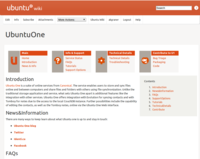In this interview with Strategic Architect for Ubuntu One, Stuart Langridge, I kick off the first of a series of articles about Ubuntu One.
Today, we’ll learn a little more about Langridge and his involvement with Ubuntu One and a brief overview along with future plans for this personal cloud service.
Naturally we can’t cover all the ends and outs of Ubuntu One in one interview, so hopefully we’ll be able to highlight one feature per article over the next few weeks. We’ll also begin to cover how the community can get involved in the process.
Amber Graner: Stuart what is your role at Canonical?
Stuart Langridge: I’m the strategic architect for Ubuntu One, and I run the Futures team. What this means is that I’m responsible for working out what Ubuntu One should do, working with partners and developers and the community to make that happen, and talking about it to people. I also run the App Developer Programme, which is a new thing to help people add the personal cloud to their applications and to bring Ubuntu One to new places.
Amber Graner: How long have you been involved with Free and Open Source Software and what made you get involved? When and how did you get involved with Ubuntu?
Stuart Langridge: At university in the mid-90s, I found myself for the first time using Unix machines (HP and Sun), and then I discovered that I could do the same things on my own machine, first with Minix, then Slackware, then Debian. I gradually grew to want the power that my machine gave me and to love the concept of open source, but also to want a machine which didn’t make me be super-technical every day just to get that; it’s nice to not have to, even if you can. At almost exactly the same time, the first release of Ubuntu came about, and I never looked back.
Amber Graner: As one of the lead developers for Ubuntu One can you tell readers what Ubuntu One (U1) is?
Stuart Langridge: The website’s got a good description here: Ubuntu One is the personal cloud that brings your digital life together, so you can enjoy your content, your way, wherever you are. With our suite of cloud services including storage, sync, sharing and streaming – you have immediate access to your music collection, favorite photos, videos, important documents and more, at any time and from any device.
Amber Graner: What do you believe the biggest advantage Ubuntu One offers end users? Why would a user want to choose U1 over dropbox, Amazon or similar services?
Stuart Langridge: Ubuntu One is a whole personal cloud. Most of the other services don’t encompass as much: file sync OR music streaming OR being integrated into your desktop OR apps that can live on desktop and web and mobile and share data, but not all of them.
Amber Graner: In addition storage solutions offered, tomboy note and automatic file syncing what else should users know about U1?
Stuart Langridge: The thing I personally find most useful with Ubuntu One is music streaming; I uploaded all my music into the personal cloud and now it’s all available to me to play whenever I want. I never have to "sync" my phone, plug a cable in, any of that. It’s really handy! I also publish files a lot; if I want to show someone a picture or something, I just tell Ubuntu One to publish it and that gives me a URL for it that I can send to others. Publishing’s easy — I’ve already added most of the folders with stuff that I care about (Pictures, Documents, and so forth) to U1 so that that stuff’s available everywhere to me, which has saved me on a number of occasions where I don’t have my laptop but was able to grab something from my phone or someone else’s web browser.
Amber Graner: How can users use Banshee and U1 to manage their music needs?
Stuart Langridge: Banshee’s got some interesting ways to organise your music; its automatic scoring gives you a way of working out what you *actually* listen to a lot, and creating playlists. It’s also where I buy music; the Ubuntu One music store being built-in to Banshee means that I’ll fairly often just buy songs on a whim, which is handy; instant gratification! I’d love to see closer integration between Banshee and U1 music streaming; at the moment they’re separate but complementary, and it’d be great if they worked closer together. This seems like a great project for someone to hack on as part of the app dev program 🙂
Amber Graner: What are the plans for U1 for 11.10 and how can the community help? What can non-developers do to help with U1? What do you need from developers?
Stuart Langridge: What I’d love to hear from developers is ideas and how they want to work on them. I’ve got a good understanding of the Ubuntu One APIs (and am trying to gradually document them at https://one.ubuntu.com/developer ) and I’d love to chat to people about their ideas for how they can make their apps better with Ubuntu One, or what cool apps you can build if you have syncing and data and music capabilities built in.
Thanks Stuart and I look forward to learning more about Ubuntu One and sharing it with the community. More information about how to get involved with Ubuntu One can be found on both the Ubuntu One website and wiki page.
Originally Posted here on 2011-09-20


